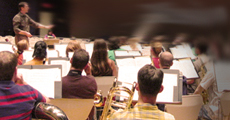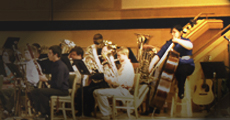Martin Luther: From Fear to Faith
by Daryl Cornett
 Marin Luther was not born a Protestant. He entered the late medieval world in the heart of the Holy Roman Empire, which had been dominated by over 1,000 years of the history and religious traditions of the Roman Catholic Church. Luther’s reality was defined by strict hierarchical systems and authoritarianism in matters of state and church.
Marin Luther was not born a Protestant. He entered the late medieval world in the heart of the Holy Roman Empire, which had been dominated by over 1,000 years of the history and religious traditions of the Roman Catholic Church. Luther’s reality was defined by strict hierarchical systems and authoritarianism in matters of state and church.
Although Luther came from a peasant household, his father had managed to become a moderately successful businessman, enabling him to send his son to school. The choices of professions were limited to medicine, law, or theology. Hans Luther decided it would benefit Martin and the entire family if his son studied law; therefore, the eighteen-year-old Luther enrolled at the University of Erfurt in 1501.
As Luther tells the story, he was caught in a frightening lightning storm on a trip home to visit family in 1505. In a moment of despair, he cried out to St. Anne. If she would spare his life, he would become a monk. After surviving, he made good on the vow and left his study of law and joined an Augustinian order in Erfurt, much to the disapproval of his father. This is where Luther’s spiritual journey truly began.
As a monk, Luther set out to secure his personal salvation with God. He devoted himself completely to a rigorous life of disciplined prayer, work, and self-denial. Ironically, the more he abandoned himself to religious observance the more uncertain he felt regarding the state of his soul. The German word Luther used to describe his emotional state was anfectung. At its root, this word refers to a deep sense of dread and despair, which one cannot escape. The more he strove to earn God’s favor through his devotion, the more keenly aware he was of his selfish motives of simply wanting to escape God’s judgment. It was a crazy cycle of self-defeating effort that only led to increasing despair in the search for peace.
During this agonized spiritual searching, Luther was given the opportunity to go to Rome on official business for his Augustinian order. Rome had been the epicenter of Christianity for centuries. It was the residence of the pope, the one who supposedly stood in the place of Christ on earth. The bones of Paul and Peter resided in Rome, as well as numerous other holy sites and relics. Luther hoped he would find relief for his heavy and burdened soul in the holy city. The trip was more than business; it was a personal pilgrimage in search of peace.
In Rome, he witnessed a dirty city, constantly plagued by disease, with no provision for public sanitation. He observed the Italian priests that haphazardly and irreverently rushed people through the masses. He venerated relics and climbed on his knees the scala sancta, the steps Christ climbed to the palace of Pontius Pilate that had been brought from Jerusalem. But he felt less peace and more frustration. Luther’s disappointment could not have been greater.
Shortly after this great disillusionment in Rome, Luther left the monastery for a role in the classroom. His superior had directed him to study theology, which Luther did with his typical earnestness. He was sent to lecture at the university in the small, insignificant town of Wittenberg, Germany. He began to lecture and continued his own studies, but remained spiritually restless and fearful of the judgment of God. In 1512, he was promoted to Doctor of Theology, which granted him the solemn duty of teaching the Bible and defending the doctrine and theology of the Roman Catholic Church.
Up to this point, Luther’s career as a monk did not involve a steady diet of the Bible, with the exception of the Psalms. However, in order to teach the scriptures to young aspiring academics, he would have to dive deeper into them than he ever had. He was appointed as professor at the new university at Wittenberg and as the town’s primary preacher. These two endeavors combined in short time to lead Luther to a rediscovery of biblical grace and away from a performance-based understanding of salvation.
As Luther dove deeply into the scriptures, he was preoccupied with the vexing problem of how sinful people, like himself, could possibly satisfy the demands of a righteous God. According to the teaching that had been ingrained in him, it was supposedly simple: if he simply did his best in faithful devotion to God, then God would do the rest in regard to his salvation through the authority granted to the church. Luther found such an understanding increasingly unconvincing. He perceived that it was a hopeless struggle, which in turn caused him to hate God for demanding of him what he could not do. What he needed was a whole new way of understanding how a sinful person could have a saving relationship with a righteous God.
 The paradigm shift in Luther’s mind and the rediscovery of biblical grace probably came in 1515, when he was lecturing through the book of Romans. Later in his life, Luther explained that it was in the first chapter of that epistle that he found the answer to his spiritual struggle, particularly with understanding 1:17: “For in it [the gospel] the righteousness of God is revealed from faith to faith, as it is written, ‘The righteous shall live by faith’.” (ESV)
The paradigm shift in Luther’s mind and the rediscovery of biblical grace probably came in 1515, when he was lecturing through the book of Romans. Later in his life, Luther explained that it was in the first chapter of that epistle that he found the answer to his spiritual struggle, particularly with understanding 1:17: “For in it [the gospel] the righteousness of God is revealed from faith to faith, as it is written, ‘The righteous shall live by faith’.” (ESV)
He discovered that the righteousness that God demanded was not something he could provide; it was a gift that God gave. Salvation was not something that he could earn; it was realized through the grace of God alone by faith alone. Years later, Luther reflected on this shift from fear to faith in the preface to his 1545 edition of his Latin writings.
I began to understand that the “justice of God” meant that justice by which the just man lives through God’s gift, namely by faith. This is what it means: the justice of God is revealed by the gospel, a passive justice with which the merciful God justifies us by faith, as it is written: “He who through faith is just shall live.” Here I felt that I was altogether born again and had entered paradise itself through open gates.
From that moment Luther’s direction was set. This understanding of personal righteousness as a gift from God through faith alone and apart from religious works put him at odds with his own religious tradition. Further events would continue to pull him down the path of theological rediscovery and to become an outspoken critic of certain practices of the church. He became the potent voice and symbol of a movement that would take people back to the Bible to embrace a message of grace and faith that shook all of Christendom to its core. The persistent, fearful, and dutiful monk was transformed by a rediscovery of the biblical gospel of grace in his personal pursuit of peace with God. As a result, he proclaimed a message of faith that ignited a revolution.
Daryl Cornett is Senior Pastor at First Baptist Church in Hazard, KY. He blogs regularly at http://darylcornett.blogspot.com.





